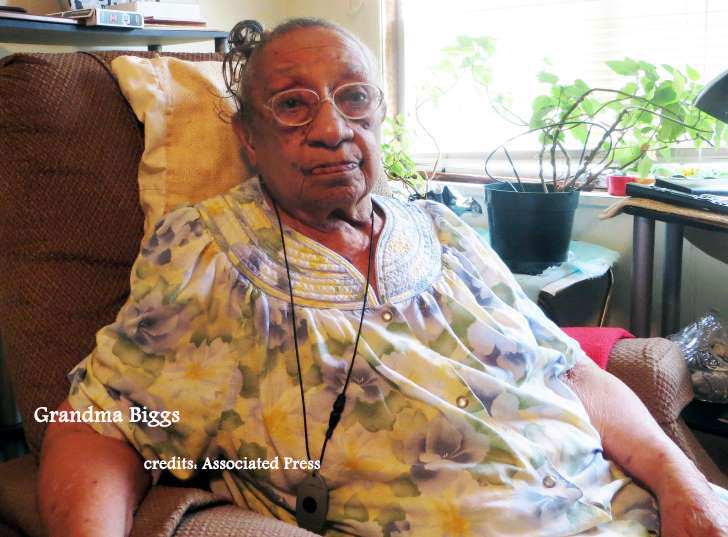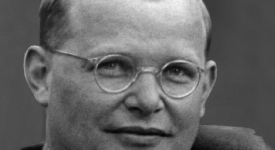On September 18, 2015 the Associated Press (AP) carried a story headlined “Ga. church revokes membership of 103-year-old woman”. Why I took interest in the story was because of the ways the characters involved fall within the category of scripture utilizers. “It was determined by the congregation during a church conference meeting, which Mrs. Biggs was present at the time of the meeting, that the behavior of Mrs. Biggs and others was detrimental to the church at large and could no longer be allowed,” according to the statement.

source: Associated Press
For purposes of this recreation, let us simply assume that the woman in question, Genora H. Biggs, is a/my grandmother. According to the AP storyline the grandmother congregation member at Union Grove Baptist Church of Elberton was accused of “displaying conduct detrimental to the congregation.” And it went on to emphasize that: “The woman has been a church member for 92 years but disagreed with its pastor, Timothy Mattox, about worship practices that include laying hands on members.” The part about disagreeing with her pastor is key to our understanding of culture politics in this spiritual environment called church.
Before concluding this piece a brief statement on heresy is in order.
In “Canon Formation and Social Conflict in Fourth-Century Egypt: Athanasius of Alexandria’s Thirty-Ninth Festal Letter”, which was published in the Harvard Theological Review David Brakke (1994), David Brakke shows gave the complex and conflicting picture of the period: from “study groups led by charismatic teachers, Melitian communities centered around the veneration of martyrs, and the emerging structure of imperial orthodoxy headed by Athanasius all presented themselves as legitimate expressions of Christian piety,” as against the often misleading representation of a single, united church. So conflicts in the church are now problems peculiar to this century. In fact, more than any spiritual indicators, these conflicts frequently are reflectors of immediate socio-political and cultural biases, which Virginia Burrus, in another edition of the Harvard Theological Review entitled “The Heretical Woman as Symbol in Alexander, Athanasius, Epiphanius”, noted could as well be versions of the same story–told differently.
Heretic is the label given to the loser in any battle over hermeneutical supremacy. Victors necessarily vanquish the victims so “that others may fear” (Titus 1: 13). From here it may be easily surmised that the power base of presiding leadership at Union Grove Baptist Church of Elberton was shaky with grandma Genora H. Biggs challenging the introduction of a new canonicity by the pastor. Certainly, in similar kind of spiritual atmosphere where, more often than not women are advised, or overly instructed to “remain silent” (1 Timothy 2:12) using certain scriptural hermeneutical parameters, grandma Biggs actions, instead of being negatively viewed effrontery or rebellion, should be celebrated as inspiring courage, a call to duty.
Grandma Biggs’ recognition that the minister in charge was a “holy sanctified minister” which was “voted” in before they knew of the strange display of “laying on of hands”, a practice which, grandma, for the 92 years of her membership with church, had been taught to know as heretical practice. Unless the pastor had been that long or longer in the church than the 103-year mama of faith, we need to give some benefit of the doubt to her that she knew what she was talking about. Indeed it may be fashionable practice among contemporary preachers, including the alleged “laying on of hands”, but as far as grandma had been with the church she knew that “such activities aren’t Baptist but were introduced at the church by Mattox”, pastor of the church who also expelled her continued membership over claims that signalled “conduct detrimental to the congregation.”
In a dramatic twist the Reverend Rev. Tim Mattox himself was fired by a vote of o confidence by the congregation. It was there and then that the real culture and power play started coming forth. Eliott Dye, grandson to Mrs. Biggs, and another long standing member of the church–a record 30-year membership–regrouped in effort to regain control of the church they call home, led other church members on what is now a successful counterattack mission. It turned out that, more than the spiritual coats given to the controversy, Reverend Mattox, is is alleged has emptied the church coffers. Dyle alleged that upon examining the church’s financial accounts, “approximately $23,000 was withdrawn from the building and operating funds,” reports Wayne Ford (Online Athens).
Of course to the day-to-day reader and believer in scriptures–assuredly embossed on our hearts in English– probably grandma Biggs might be seen as troublemaker, an unbeliever, or one who dares the “anointed.” Only when engaged from deeper level of critical reflection could revelations of complex human politicking be exposed. Postcolonial/post-slavery pretensions regardless, power is socially constructed, community deployed and those who dare the edge of its sword tell of its direct piercing or its crude and unforgiving bluntness, if they ever survive alive to tell the story.








